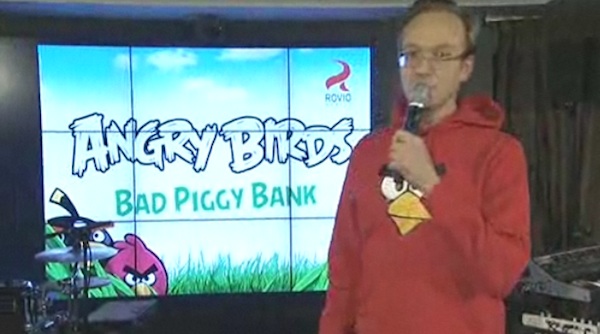
Angry Birds is already minting money. So who better than Rovio, makers of the smartphone game, to make spending easier for all kinds of apps with "Bad Piggy Bank."
It's an in-app purchasing scheme that works on the same level of simplicity as the game itself--a few clicks and in-app purchase of the new Might Eagle add-on will be possible, as will removal of the ad system. "No registration, no credit cards, no hassle," because it's charged via the service provider.
Angry Birds is, as we all know, something of a revelation in the mobile gaming world--exhibit A: the first "Angry Birds Day" fan event coming up with meet-ups in "hundreds" of cities around the world; exhibit B: statistics showing a move away from handheld gaming consoles to smartphones. But Rovio said today that 200 million minutes are spent playing Angry Birds every day, which "rivals prime time TV. The 50 millionth download happened today, too, with an average of one million downloads per week happening across all platforms--though Rovio took pains to note every week's sales have exceeded the previous one, so sales are still accelerating. The company's stated goal is 100 million sales by Summer 2011, which "our friends at Tetris did in 20 years."
This kind of success--and promised future success, since Rovio's promising Angry Birds will be available on "all relevant platforms" including consoles and Windows Phone--has made the company very bullish, and it's leveraging its power in a way that will please Android customers, and probably displease cell phone service providers around the world. Rovio's team noted that the "payment and purchase experience has been less than excellent" on Android, which may be one reason the system is heavily biased to ad-supported free games rather than paid-content apps.
Rovio is releasing Bad Piggy Bank for their own game first but then rolling it out to all other app developers in early 2011. They won't reveal the revenue sharing model, but its "better" than the current app store model wich divvies up profit percentages 70/30--and though Rovio is open to sharing some revenue with the network operators too, its definitely keeping its "fair share," because it invented and is running the new system and did so independent of the cell phone operators (and is thusly keeping them out of the equation as much as possible in the future of mobile gaming). Rovio's head Peter Vesterbacka made specific mention of the "previous generation" of mobile gaming being held back by operators who controlled everything, deciding "what was good for you."
Is a game developer, inspired by Apple, sticking it to the multi-trillion-dollar (and apparently customer-hating) global cell phone industry? Like an angry bird popping a pig, it is.
To read more news on this, and similar stuff, keep up with my updates by following me, Kit Eaton, on Twitter.
Marisa Coughlan Shanna Moakler Portia de Rossi Jolene Blalock Nichole Robinson
No comments:
Post a Comment